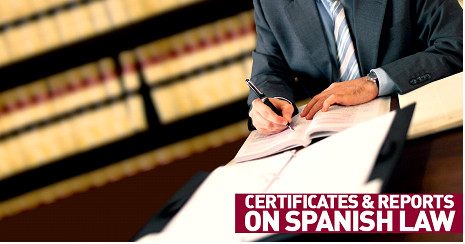Our offices frequently receive, usually come from other law firms located outside of Spain, a request to provide certificates or report on Spanish law, existing court precedents concerning a particular matter, or our views of how a dispute should be resolved under Spain’s rules etc., normally this is known as an affidavit.
It should be noted that not all certificates or law reports are the same, as sometimes it would depend upon the country where they need to be used, or the formalities requested, whether it should be apostilled or not, etc.
Normally the law certificates to be used in foreign countries that we perform are drafted and signed by a registered lawyer of our law firm. Depending on for what it needs to be used, or the formalities required by the authority, we sometimes make a statement before a Spanish notary who acknowledges the veracity of the content, and the validity of the regulations mentioned within.
We are mainly asked to prepare reports on inheritance, wills and successions under Spanish law, for example:
-Formalities of Spanish Wills.
.-Who must inherit according to Spanish law when there is no will (intestacy rules) ?.
.-What is the applicable law to the succession of a particular person in Spain, depending on their nationality, habitual residence / domicile, date of death ?.
To give an example, we recently made a certificate of law to be used in the United States. It appears that in the system of that country, as happens in many other countries in an inheritance process, the original will with the signature of the testator or testatrix must be reviewed by the judge or competent authority. In this specific case the Will in question was a Spanish Will. Our report and certificate confirmed that under Spanish notarial and regulation law, the original Will signed notarized by the testator or testatrix cannot leave or be removed from the notary protocol or deposit, where it must remain always, and all deeds and Wills are signed before the notary.
Therefore, to process an inheritance based on a Will granted before a Spanish notary, the notary would issue what we call a literal copy, ie a new document that transcribes the full text of the original will, which certifies that the text is the exact part of the original Will or matrix. This copy is not a photocopy, therefore, in this literal copy the signature of the testator or testatrix does not appear.
So if you, your lawyer or your clients, need a certification, report, affidavit or opinion of the Spanish legislation, court precedents, case law on a particular matter, our firm can help. Contact us and we will help you.
The information provided in this article is not intended to be legal advice, but merely conveys information related to legal issues.
Carlos Baos (Lawyer)
Spanish Law firm solicitor attorney barrister.
Alicante, Denia, Costa Blanca Marina Alta
White & Baos 2016 – All rights reserved
